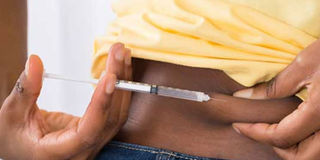Facility to boost insulin supply launched

New pill promises to help diabetes patients avoid daily injections. PHOTO | FILE
What you need to know:
- The Sh12-million cold room is part of a public-private partnership partly financed by Novo Nordisk, a leading supplier of human insulin and set up by the Mission for Essential Drugs and Supplies (MEDS), which has been supplying 27 counties with insulin since the partnership was launched in 2012.
- Dubbed “Base of the Pyramid” and targeting patients with low incomes, the partnership also led to a drop in the price of insulin by more than 70 per cent from Sh2, 000 to Sh500.
Diabetes patients in Kenya will now get uninterrupted supply of insulin, the hormone used to manage blood sugar levels, following the setting up of a high-tech cold room that will enhance the storage of medicines for a larger number of patients.
The facility which was launched at the beginning of June will hold 448 vials of insulin or 48, 000 flex pens, which are sufficient to serve over 25, 000 patients.
The Sh12-million cold room is part of a public-private partnership partly financed by Novo Nordisk, a leading supplier of human insulin and set up by the Mission for Essential Drugs and Supplies (MEDS), which has been supplying 27 counties with insulin since the partnership was launched in 2012.
Dubbed “Base of the Pyramid” and targeting patients with low incomes, the partnership also led to a drop in the price of insulin by more than 70 per cent from Sh2, 000 to Sh500.
However, challenges in storing insulin due to limited cold room space, attributed to rising demand for insulin, necessitated the setting up of a bigger cold room to store more of the essential hormone. Similar projects are running in Ghana, Nigeria and India, with Senegal set to join the fold later this year.
According the World Health Organisation’s Global Diabetes Report (2016), the prevalence of diabetes in Kenya is at 6 per cent, with 12,000 Kenyans having died from diabetes-related complications anDubbed “Base of the Pyramid” and targeting patients with low incomes, the partnership also led to a drop in the price of insulin by more than 70 per cent from Sh2, 000 to Sh500. d high blood glucose in 2014.
Cases of diabetes have increased four-fold worldwide since 1980, and an estimated 60 per cent of all diabetes cases are missed at the point of diagnosis in Kenya.


